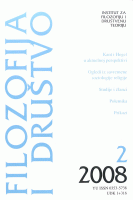Koncepcija primjene prava Džona Djuija u svom filozofskom i socijalnom kontekstu
John Dewey’s Conception of Application of Law in Its Philosophical and Social Context
Author(s): Bojan SpaićSubject(s): Philosophy
Published by: Institut za filozofiju i društvenu teoriju
Keywords: John Dewey; pragmatism; philosophy of law; application of law; experimentalism; social process; sociologism;
Summary/Abstract: John Dewey, one of the most important thinkers of pragmatism, elaborated a specific conception of law partially and gradually in the long course of his intellectual career. This part of his broader philosophical outlook is analyzed here through one of its most important segments – application of law – and interpreted in its historical, social and cultural background. The first part of the article concentrates on the „objective“ (cultural, social and historical) reasons for giving emphasis to the application of law in his legal philosophy. This domination of the application of law in his legal thought is derived from the needs of a rapidly changing structure of the American society in the first half of the XX century, and theoretically has its place in an all around phenomenon in American intellectual history in general that Morton White terms antiformalism. The second part of the article analyses his legal conceptions and their connection with the general philosophical position of this pragmatist. Dewey formed his conception of application of law as an integral part of his broader philosophical standpoint, and especially on the basis of his radical reinterpretation of logic and truth. Since his understanding of the legal process has roots in his experimentalist conception of logic that encompasses the apprehension of the process of experimentation as the only warrant for the validity of propositions (that the „truth“ of a proposition is built in the process of its verification), he regards application as conditio sine qua non of the legality of norms in general. This leads us to the last part of the article that scathes possible lines of critical approach to Dewey’s work in this field. The view that the legality of norms is derived from their application is in legal theory often regarded as sociologism, inasmuch as it disregards the normative aspects of the legal process and emphasizes the social ones to the point of making it void of the normative aspects in the totality of the process itself. The proper understanding of possible lines of criticism of Dewey’s standpoints in legal philosophy guides us back again to confront his conceptions with their cultural background, with which the article begins.
Journal: Filozofija i društvo
- Issue Year: 2008
- Issue No: 36
- Page Range: 221-253
- Page Count: 29
- Language: Serbian

